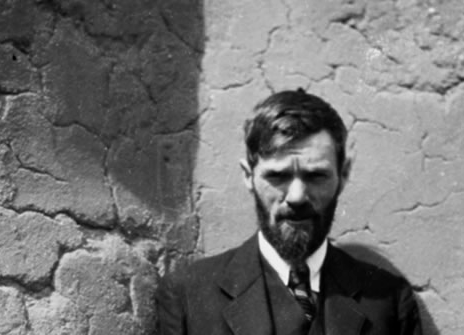The Drama of D.H. Lawrence: Regional Identity and Space
Project led by:
James Moran (from the D.H. Lawrence Research Centre)
Funded by:
A British Academy Mid-Career Fellowship
Overview
In critical studies of D.H. Lawrence and modernist literature, Lawrence’s plays are usually viewed as something interesting but inessential: Ian Clarke noted in 2001 that ‘No other generic body of Lawrence’s work has suffered such extensive obscurity.

Lawrence’s talent as a playwright was to speak about day-to-day personal relationships
However, this project shows that Lawrence remained deeply concerned with performed drama throughout his career, proved himself a skilled playwright, and that the theatrical element of his work is key to understanding Lawrence’s development and his overall achievement as a writer.
The research shows that Lawrence’s talent as a playwright was to speak about day-to-day personal relationships, particularly those of the overlooked mining communities in the English East Midlands, yet to do so through a sophisticated set of theatrical techniques, which he discovered by reading and watching an impressive range of drama. In broad terms, then, the research therefore illustrates how the current transnational turn in modernist studies might productively be accompanied by a turn towards local and regional engagement.
Monograph
The fellowship gave me the opportunity to complete a monograph about D.H. Lawrence’s drama. This book is entitled The Theatre of D.H. Lawrence: Dramatic Modernist and Theatrical Innovator, and was published by Bloomsbury Methuen Drama in October 2015. This is the first full-length book to examine Lawrence’s drama for more than 30 years, and it draws attention to the way that Lawrence engaged in profound ways with both regional and international theatre. My study also looks at the way that Lawrence’s playwriting influences his novels, which are shown to be deeply influenced by Lawrence’s knowledge of theatre. And I also focus upon the experimental nature of Lawrence’s theatrical technique. I was particularly pleased that I was able to include in my study some original contributions from both theatre makers and theatrical thinkers – including Soudabeh Ananisarab, William Ivory, Stephen Lowe, Richard Eyre, and Peter Gill. Their interventions highlight the fact that, although Lawrence’s plays have been neglected in academic criticism, in public performances from the Royal Court to Coronation Street, his dramatic thinking has continued to exert an influence.
Online article
The fellowship also allowed me to complete the 10,000-word bibliographic article ‘D.H. Lawrence’ for publication in Oxford Bibliographies in British and Irish Literature (Oxford University Press, USA). The Oxford Bibliographies are designed to provide expert guidance through the proliferation of sources.
Public performance
The fellowship also funded a rehearsed reading of Lawrence’s play ‘The Widowing of Mrs Holroyd’. This reading allowed local audiences to engage with an important aspect of their local history, and I was pleased that – as the after-show discussion revealed – we had a diverse audience. The production showed how Lawrence’s plays, with their strong regional dialect, have the power to be profoundly affecting when staged in Nottinghamshire.
Lectures and Talks
During the fellowship, Jim gave a number of talks about Lawrence. These included:
- 5 December 2013, at 3pm, on BBC Radio Nottingham he discussed D.H. Lawrence’s playwriting with a particular focus upon his script ‘The Daughter in Law’.
- 2 June 2014, at 3.20pm, on BBC Radio Nottingham he spent time discussing how Lawrence’s drama affected his prose fiction, focussing on the unfamiliar short story, ‘Newthorpe in 2927’.
- 22 September 2014, at 2.20pm, on BBC Radio Nottingham he spoke about Lawrence’s sense of dramaturgy, and focused in particular upon his play ‘The Widowing of Mrs Holroyd’.
- 24 September 2014, he delivered a free public lecture at the Nottingham Playhouse. This well-attended lecture was on ‘Lawrence onstage’, and the lecturer discussed Lawrence’s connection with local drama, including the theatre’s own work in the 1970s.
- 8 October 2014, he gave a public lecture on ‘Connecting Lawrence’s Drama and his Novels’. This was delivered in D.H. Lawrence’s home town of Eastwood, at Durban House, the Lawrence Heritage Centre. Jim was grateful for the help of the Malcolm Gray and the D.H. Lawrence Society in Eastwood for helping to advertise this talk and drum up a good audience.
- 10 July 2014, he organised a lecture-workshop session on Lawrence’s playscripts at Hall Park Academy (with the very wonderful Andrew Harrison). This session was mainly attended by year-10 drama students from the school, and they were brilliant!
- 17 July 2014, he gave a paper entitled ‘Time to call PETA? D.H. Lawrence, Cruelty, and Ireland’ to the International Association for the Study of Irish literature in Lille.
Work with Theatres
Jim’s work on Lawrence’s drama led him to work with the Royal National Theatre in planning and delivering the educational outreach of their 2015-2016 Lawrence play Husbands and Sons.
Back to top